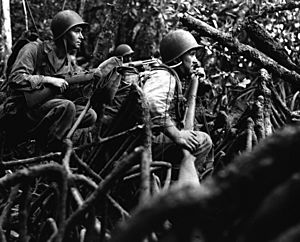G.I. facts for kids

The term G.I. is used to describe soldiers of the United States Army and airmen of the United States Air Force. It also refers to the equipment they use. The term first appeared during World War I. At that time, much of the government-issued equipment was stamped "G.I." This meant it was made from "galvanized iron," a type of strong metal.
Over time, people started to interpret "G.I." in other ways. It became known as "Government Issue" or "General Issue." This referred to anything provided by the government for soldiers and airmen.
Contents
How the Term "G.I." Became Popular
During World War I, American soldiers sometimes joked about German artillery shells. They called them "G.I. cans." This was a sarcastic way of talking about the shells.
The term "G.I." became very common in the United States during World War II. It started to be widely used around 1940 and 1941. Before this, American soldiers were often called "Doughboys" during World War I. "G.I." gradually replaced this older term.
By 1945, "G.I." was a well-known name for American soldiers. Dwight D. Eisenhower, a famous American general, spoke about "G.I. Joe." He said that "G.I. Joe" was the true hero of the war. This showed how important the term had become.
"G.I." was also used as an adjective. This meant it described anything related to the U.S. Army or the Army Air Forces.
"They Call Me Joe" Radio Series
In 1944, a radio show called They Call Me Joe was broadcast. Each episode of this show focused on a different made-up American soldier. These soldiers came from various national or ethnic backgrounds. However, they were always identified as a "G.I." named Joe.
The main goal of this radio series was to encourage cooperation. It aimed to show Americans from different backgrounds working together to win World War II. The show ran for twelve weeks. It was heard on both the NBC Radio Network and the Armed Forces Radio Network.
G.I. Joe Action Figures
The popular "G.I. Joe" action figure was first introduced by Hasbro in 1964. Its name came directly from the term used to describe soldiers during the war. This toy helped keep the "G.I." name famous for new generations.
Other Uses of G.I.
In the British military, and in armed forces that follow British traditions, "G.I." has a different meaning. It refers to a "Gunnery Instructor." This is usually an experienced non-commissioned officer (NCO). Their job is to train new recruits in how to use weapons.
See also
 In Spanish: GI para niños
In Spanish: GI para niños
- Digger (soldier) – A similar term used for soldiers in Australia
- Dogface (military)
- G.I. Bill – A law that helped soldiers after World War II
- G.I. Blues (film)
- G.I. Generation – The generation of people who fought in World War II
- G.I. Jane (film)
- G.I. Jill – A disk jockey during World War II
- G.I. Joe (pigeon) – A famous pigeon who served in World War II
- G.I. Joe (disambiguation)
- G-Man (slang) – A slang term for an FBI agent
- The Story of G.I. Joe (1945 film)
- Tommy Atkins (soldier) – British slang for a common soldier
- Mehmetçik (soldier) – Turkish slang for a common soldier
 | Jewel Prestage |
 | Ella Baker |
 | Fannie Lou Hamer |

